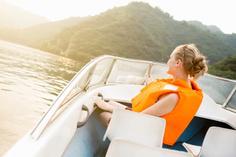
It is completely understandable that on holidays you might feel like throwing all caution to the wind and just concentrate on having a great time. Be it a skiing trip to Switzerland or a jungle safari in Africa, or a boating trip to the Bahamas, it’s only natural to become footloose and fancy free and indulge in the adventurous activities that you’ve always wanted to do. However, as our elders had warned us at some point in our lives, there is such a thing as “having too much fun.”
If only you could have your cake and eat it too! Having fun without considering the safety aspect of it brings with itself its own set of troubles. Holiday misadventures and tragic events are not as uncommon as you think them to be. There are accidents waiting to happen if you’re not careful enough to protect yourself. If you or your loved one has been a victim of a boating accident that has resulted in injuries (or death) due to another person’s recklessness, be sure to contact an able and
experienced accident lawyer to help you bring those responsible to book and claim a substantial compensation which you rightly deserve.
Enjoy the pleasure of boating and have fun but do not forget to be responsible at the same time. In this post, we would be addressing some of the basic safety tips that you need to keep in mind when you go for your next boating trip.
Life Saving Life Jackets
Yes, we know you don’t like wearing life jackets because they look and feel very bulky, but you will only be doing yourself a favor by wearing one while boating. In fact, you will do good to ensure that it is not just you, but everyone on the boat who is wearing a coast guard approved life jacket or
Personal Flotation Device (PFD) for their own good.
No Drinking While Boating
There are some things that you just shouldn’t do. Period. This is one of those things. Leave the alcohol behind on dry land and avoid its consumption before you go boating. You don’t want to end up losing your senses or getting dizzy while riding a boat and smashing it against another object. It is important that you are fully in control of the boat so that things don’t go wrong.
Check the Weather Conditions
Too cold? Too windy? Too cloudy? Looks like it’s going to rain heavily? Well, then stay indoors and postpone your boating trip to another bright and sunny day. Always make it a point to check the weather forecast before you plan your boating trip. Boating in adverse weather conditions can result in accidents. Look out for any changes in the weather and seek up to date weather and storm related information. Bad weather can also hamper visibility and that is a sure shot reason for an accident to take place.
Boating Safety Course
Gaining knowledge has never harmed anyone. In fact knowledge empowers people to deal with problems. It is always advisable to take up a course in boating safety as a precautionary measure. Such courses go a long way in equipping you with knowledge related to the safety and navigational aspects of boating. They also teach you about techniques that prepare you to face a mishap, just in case it takes places.
Speed Safety
We’re not referring to the movie ‘Speed’ because we’re aware that that kind of stuff doesn’t apply to real life. Although there are no defined speed limits, depending on the climatic conditions, traffic and proximity of other vessels and other objects around you, you will be required to operate your boat at an appropriate speed. Do not get into unwarranted boat racing and try to increase the speed to more than what is required. Remember, your boat has its limitations and you will need to respect them.
Boat Safety Equipment
Undermine the utility of boating safety equipment at your own peril. Besides life jackets, some of the equipment that you need to have onboard at all times are fire extinguishers, boat lights, torch, maps, distress flares and first aid kit. Additionally, check for engine errors and make sure that the motor is in proper working condition. Ensure that there is enough fuel in your boat to avoid getting stuck in the middle of nowhere.
No Overloading
Don’t torture your boat with excessive weight. Avoid overloading the boat with passengers or unnecessary luggage/equipment and other things. Each boat is made to accommodate only a certain amount of weight which has to be evenly distributed throughout. This information is mentioned on every boat. Overloading the boat may result in it capsizing, losing balance, flooding or sinking.
Submerged Objects
Remember the movie ‘Titanic’ and the fate of the large vessel? Who can ever forget the villainous iceberg that sank such a huge ship? Don’t feel so safe in a boat now, do you? Hence, do make it a point to watch out for submerged objects and rocks in the water that may evade your visibility to avoid crashing into them. Crashing into such objects would mean severe damage to your boat as well as putting your and your passenger’s life in serious danger.
To Conclude
Boating is a fun activity and there is no reason why such an activity should become a source of grief to anyone. Always remember that
accidents and mishaps never announce their arrival, they just occur when you’re least expecting them. It is important to be alert and stay sharp always to keep boating mishaps at bay.